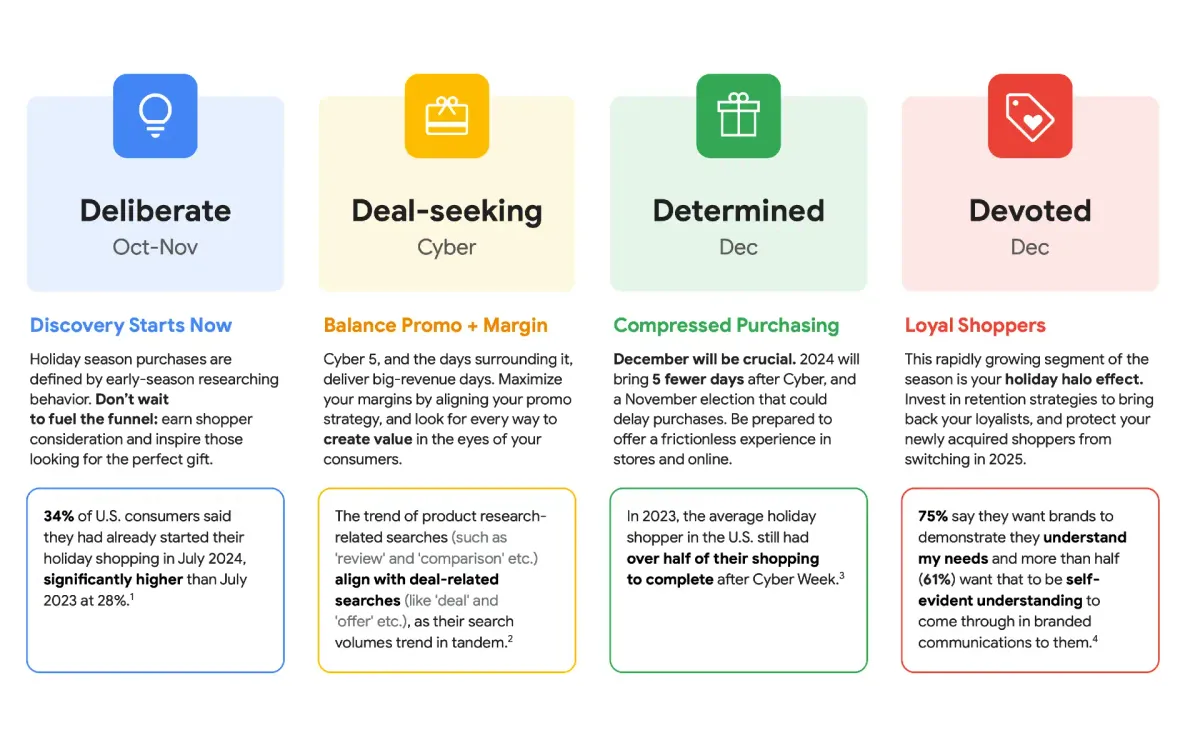
Google this month hosted its annual Think Retail Digital Event, providing retailers with insights and strategies for the upcoming holiday shopping season. The event, which took place earlier this year, focused on leveraging artificial intelligence (AI) and understanding consumer mindsets to maximize sales during the crucial holiday period.
According to the event handbook, Google introduced a new framework for understanding holiday shoppers, dubbed the "4 D's" model: Deliberate, Deal-Seeking, Determined, and Devoted. This model aims to help retailers tailor their marketing strategies to different consumer behaviors throughout the holiday season.
The Deliberate phase, which typically occurs in October and November, is characterized by early-season research behavior. Google emphasizes the importance of fueling the sales funnel during this period by earning shopper consideration and inspiring those looking for the perfect gift. Retailers are advised to start their holiday marketing efforts early to capture this audience.
The Deal-Seeking phase aligns with the Cyber Week period, traditionally the busiest shopping time of the year. Google suggests that retailers balance promotional offers with profit margins during this time. The handbook recommends creating value for consumers beyond just discounts to maximize revenue.
December marks the Determined phase, which is expected to be particularly crucial in 2024. According to the event materials, there will be five fewer days between Cyber Week and Christmas compared to the previous year. Additionally, the U.S. presidential election in November could potentially delay some purchases. Google advises retailers to prepare for a compressed purchasing period by offering frictionless experiences both in-store and online.
The final phase, Devoted, represents a growing segment of loyal shoppers who return to their favorite brands after the holiday season. Google recommends investing in retention strategies to bring back these loyal customers and protect newly acquired shoppers from switching to competitors in 2025.
To support these strategies, Google introduced several AI-powered tools and features during the event. One key recommendation is to set an "AI foundation" to capture consumer demand effectively. This approach includes simplifying account structures, improving image and text assets, and providing algorithms with the right data signals.
The event also emphasized the importance of aligning marketing budgets with key shopping periods. Google suggests using tools like the Performance Planner to forecast optimal targets and budgets for business outcomes during peak seasons. Campaign Simulators were highlighted as a way to identify conversion value and investment mix scenarios to deliver maximum returns.
Google's Merchant Center Insights tool was presented as a means for retailers to better understand their customers and competitive landscape. The company also promoted its Performance Max for Store Goals feature, which aims to deliver on last-minute demand via upsell and cross-category purchases.
Creative strategies were not overlooked, with Google recommending that retailers ensure creative coverage for each holiday mindset. This includes using at least four unique image assets and one Responsive Search Ad (RSA) with good or excellent ad strength for each campaign.
The event handbook provided detailed best practices for optimizing product feeds in Google Merchant Center. These recommendations cover areas such as data quality, product titles, image specifications, and the use of additional attributes to drive query relevance.
Google also highlighted the importance of enabling various annotations to help retailers stand out among competitors. These include sale price annotations, shipping speed indicators, return policy information, and loyalty program details.
For retailers with physical locations, Google emphasized the value of local inventory ads and features like "Pickup Today," "Pickup Later," and "Curbside Pickup" to drive both online conversions and in-store visits.
The event materials stressed the importance of maintaining compliance with Merchant Center policies to prevent disruptions to advertising campaigns. Recommendations included regularly checking for account-level issues, fixing high-impact item-level problems, and ensuring feed accuracy and timeliness.
Key facts from the Google Think Retail 2024 Digital Event
Google introduced the "4 D's" model: Deliberate, Deal-Seeking, Determined, and Devoted.
The 2024 holiday season will have 5 fewer shopping days between Cyber Week and Christmas.
Nearly 3 in 4 purchases are either made online or influenced by online touchpoints.
40% of holiday shoppers are described as "always on" in their search for perfect gifts.
Over 80% of search demand from September through the end of the year occurs outside of Cyber Week.
Google recommends using at least 4 unique image assets and 1 RSA with good or excellent ad strength per campaign.
The handbook provides detailed best practices for optimizing product feeds in Google Merchant Center.
Local inventory ads and omnichannel features are emphasized for retailers with physical stores.
Compliance with Merchant Center policies is stressed to prevent campaign disruptions.

